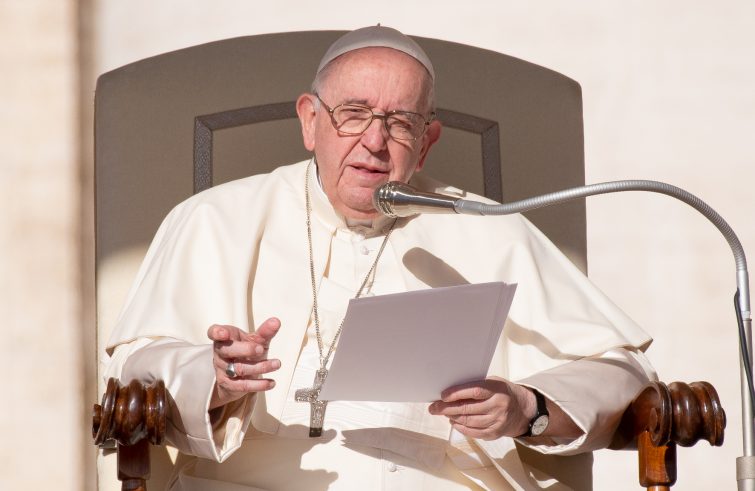
“Let us go forward with the prayer of “ciao”. With this invitation, Pope Francis concluded today’s audience, in which he resumed the cycle of catechesis on discernment focusing on the first of its constituent elements, which is prayer. True prayer “is not reciting prayers like a parrot.” True prayer is to address God with simplicity and familiarity, as one would speak to a friend. It is knowing how to go beyond thoughts, to enter into intimacy with the Lord, with an affectionate spontaneity.” “True prayer is this spontaneity and affection for the Lord”: it is the secret of the lives of the saints. “This familiarity overcomes fear or doubt that His will is not for our good, a temptation that sometimes runs through our thoughts and makes our heart restless and uncertain, or even bitter.” In the closing remarks, the Pope’s thoughts turned to “the tormented Ukraine, which is suffering so much.”
Discernment, the Pope said, “does not claim absolute certainty, it is not a chemically pure method, it does not claim absolute certainty, because it is about life, and life is not always logical, it has many aspects that cannot be enclosed in one category of thought.”
“We are not just reason, we are not machines,
it is not enough to be given instructions to carry them out: the obstacles, like the supports, to deciding for the Lord are primarily affective, from the heart.”
“Many people, even Christians, think the same thing: that is, that Jesus may well be the Son of God, but they doubt that He wants our happiness; indeed, some fear that taking his proposal seriously, that which Jesus proposes to us, means ruining our lives, mortifying our desires, our strongest aspirations.”
With these words the Pope denounced the “false image of God that Satan has been suggesting since the beginning: that of a God who does not want our happiness.” “These thoughts sometimes creep up inside us”, he explained: “that God asks too much of us, we fear that God doesn’t really love us.” Instead, “in our first encounter we saw that the sign of meeting the Lord is joy. When I encounter the Lord in prayer, I become joyful. Each one of us becomes joyful, a beautiful thing. Sadness, or fear, on the other hand, are signs of distance from God.”
“Those who turn away from the Lord are never happy, even though they have an abundance of possessions and possibilities at their disposal”,
Francis said: “Jesus never forces you to follow Him, never. Jesus lets you know His will, with all His heart He lets you know things, but He leaves you free, And this is the most beautiful thing about prayer with Jesus. On the other hand, when we distance ourselves from the Lord, we are left with something sad, something ugly in our heart.” “Discerning what is happening is not easy – the Pope said – for appearances are deceptive, but familiarity with God can melt doubts and fears in a gentle way, making our lives increasingly receptive to His “gentle light,” according to the beautiful expression of Saint John Henry Newman.” “The saints shine with reflected light and show in the simple gestures of their day the loving presence of God, who makes the impossible possible”, the first example chosen by Francis:
“It is said that two spouses who have lived together for so long loving each other end up resembling each other. Something similar can be said about affective prayer:
in a gradual but effective way it makes us more and more able to recognize what counts through connaturality, as something that springs from the depths of our being.”
At the end of the catechesis, once again speaking off -text, the Pope reiterated his opening remarks: “To be in prayer does not mean saying words, words, no: being in prayer means opening my heart to Jesus, drawing close to Jesus, allowing Jesus to enter into my heart and making us feel His presence. And there we can discern when it is Jesus and when it is us with our thoughts, that so many times are far from what Jesus wants.”
“Let us ask for this grace: to live a relationship of friendship with the Lord, as a friend speaks to a friend”,
was the Pope’s appeal to the faithful gathered in St. Peter’s Square, quoting from St. Ignatius. Finally, the Pope shared a personal story: “I knew an old religious brother who was the doorman of a boarding school, and every time he could he would approach the chapel, look at the altar, and say, ‘Hello,’ because he was close to Jesus. ‘Hello, I am close to you and you are close to me.’ This is the relationship we must have in prayer: closeness, affective closeness with Jesus. A smile, a simple gesture, and not reciting words that do not reach the heart.” “It is a grace we must ask for one another”, Francis recommended: “to see Jesus as our friend, as our greatest friend, our faithful friend, who does not blackmail, above all who never abandons us, even when we turn away from Him.”
“Even when we turn away from Him, He remains at the door of our heart”, the Pope concluded in unscripted remarks: “He remains close at hand, at heart’s reach because He is always faithful. Let us go forward with this prayer, we could say the prayer of ‘Ciao,’
the prayer of greeting the Lord with our heart, the prayer of affection, the prayer of closeness, with few words but with acts and good works.”










